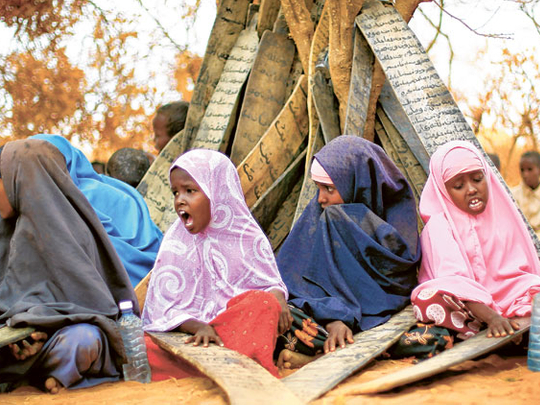
Dadaab, Kenya: Marauding gangs and criminals are attacking Somali famine refugees more frequently as they flee across the border to Kenyan camps, but Kenyan police say they don't have enough people to stop them.
The lack of officers underscores a larger problem for Kenya: Officials say they are being overwhelmed by the influx of tens of thousands of Somali refugees, and can't stem the attacks. One 30-year-old woman who watched two of her five children die as they trekked through Somalia was raped after reaching what she hoped would be the safety of Kenyan soil.
"I constantly ask myself, ‘Would this have happened to you, or would you have lost your children if you had been in your country?'" said the woman. "My mind always says: ‘You ran away from a problem and ran into another.'"
Kenya now hosts nearly 500,000 Somali refugees, and while US and UN officials are quick to praise Kenya for their response to the famine crisis, Kenyan officials are just as quick to tell the US, UN and world leaders that they can't take many more.
President Mwai Kibaki told the US vice president's wife, Jill Biden, during her visit to
Extreme pressure
Kenya on Monday the Somali refugee population was placing Kenya under extreme pressure and burdening its resources.
Echoing local Kenyan officials who live close to the border, Kibaki advocated that refugee camps be set up inside Somalia near the Kenyan border, so Kenya does not have to accept the thousands more Somalis who arrive each week.
The Dadaab refugee camp — the largest in the world — was built for 90,000 people. The current population is more than 400,000 with thousands of new arrivals crammed into areas outside the refugee camp, waiting to be formally admitted.
The police commander at Dadaab, Nelson Shilunji Taliti, said it is hard for authorities to adequately patrol the long and porous border with Somalia, leading to a rise in rape and other types of attacks.
He said police cannot specifically say who is behind the attacks but criminals, both Somalis and Kenyans, operate along the border. "Most of the victims are the ones who evade border points and pass through areas they believe are unmanned," Taliti said, advising refugees to use official points.
Gang-raped
A pregnant mother of three who spoke to AP in Dadaab said she was gang-raped by five men after a group of families travelling together was ambushed. The Associated Press does not identify rape victims.
"The gunmen issued strange orders. They asked each woman to be raped by her brother. ‘Do it immediately,' they ordered," said the woman, whom the AP is not identifying. "Some men are more audacious than others. When they were ordered to rape their sisters, they raped them to save their lives... Death is better than doing that." The attackers ordered her brother-in-law to rape her but he refused, saying: "You are men and I'm a man, and life and death is in the hands of God. Either kill me or spare me."
They killed her brother-in-law and left his body unburied.
"When they killed my brother-in-law, I wished they had killed both of us," she said. Authorities say few cases are reported, making it difficult for them to investigate and prosecute the attackers.











